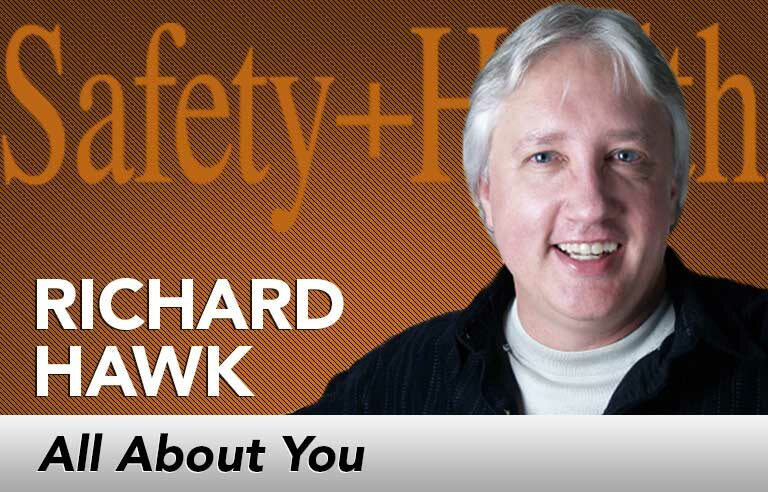All About You: Stay flexible

EDITOR’S NOTE: Motivating employees to work safely is part of the safety professional’s job. But who motivates the motivator? In this monthly column, veteran safety pro and professional speaker Richard Hawk offers his entertaining brand of wisdom to inspire safety pros to perform at their best.
How flexible are you?
I don’t mean touching your toes without bending your knees. I’m asking how easily you can handle changes in your plans and goals.
When you think a well-thought-out project is supposed to go left but it takes a U-turn, or an unexpected wrench gets thrown into the works, how much does it upset you? The ability to be flexible and easily adapt when events don’t meet expectations is a sign of emotional maturity. This type of flexibility can help your career as a safety and health professional in many ways. In fact, handling surprises well is a skill that can benefit you in all aspects of life.
The opposite of being flexible is being rigid. Sometimes being rigid has merit, such as being uncompromising about a value you live by. For example, we safety professionals have an unswerving belief that employees should always work safely. However, because the future is unknown and can alter any of our plans, being flexible gives you the ability to succeed when things change and better enjoy whatever happens. Here are ways to pump up your flexibility muscle:
Plan for the unexpected. I have a T-shirt that reads, “Doesn’t expecting the unexpected make the unexpected expected?” It’s a fun play on words, but it also relays some wise advice. When you plan something, whether it’s a work project, safety meeting or personal vacation, it’s worth the time and mental effort to consider what-if scenarios. Doing so better prepares you to handle something that varies your plans.
On one occasion, I had set up all my stuff at an office complex where I was scheduled to give two talks, when an evacuation was announced. We couldn’t use the conference room that contained the projector and my computer, props and handouts. I was concerned at first, but then I did a bit of mindful breathing and told myself to remain open to whatever happens.
I was asked if I could give the talk in another area of the complex, which was a small theater. Part of why I gladly agreed was because I had thought about and prepared for the possibility of having to give the talk without any equipment. I was ready to adapt.
In this case, being flexible created a pleasant surprise. When the time came to give my second talk, I was able to use the conference room. Although my client enjoyed both talks, he told me he liked the one I gave in the theater better because it was more spontaneous.
Avoid the ‘sunk cost fallacy.’ According to the Cambridge English Dictionary, sunk cost fallacy is “the idea that a company or organization is more likely to continue with a project if they have already invested a lot of money, time, or effort in it, even when continuing is not the best thing to do.” This tricky fallacy can affect individuals, too. So, typically, the longer you work on a new safety and health initiative, the less likely you are to give up on it – even if all indicators show it isn’t going to succeed.
One way to avoid this trap is to monitor and test what you’re working on often, and realize that it doesn’t mean you’re a failure because you have to alter or give up on a pet project or planned event. Instead, it shows you’re wise and willing to acknowledge that things change.
Focus on the objective. If a road is blocked, you take a detour. It may not be the route you planned, but you’ll still get to your destination. The same situation applies to goals and objectives. If you have to make changes to your approach or even abandon a well-thought-out idea for something that’s better at getting you to an objective, good. It’s a positive change that you should embrace.
I’ve found that being flexible and open to twists and turns provides a sense of adventure that makes life more enjoyable. Like a tree that bends with the wind, being flexible will help you better handle and expect the unexpected.
This article represents the views of the author and should not be construed as a National Safety Council endorsement.
Richard Hawk helps companies around the world create more vibrant safety cultures by showing them how to make safety fun. As a professional speaker, author and musician, he also inspires employees to focus better and enlightens safety leaders about ways to increase their influence. To learn more about Richard, visit makesafetyfun.com.
Direct to your inbox: Sign up to be notified in email about new "All About You" columns.
Listen on Soundcloud or Stitcher
Post a comment to this article
Safety+Health welcomes comments that promote respectful dialogue. Please stay on topic. Comments that contain personal attacks, profanity or abusive language – or those aggressively promoting products or services – will be removed. We reserve the right to determine which comments violate our comment policy. (Anonymous comments are welcome; merely skip the “name” field in the comment box. An email address is required but will not be included with your comment.)

